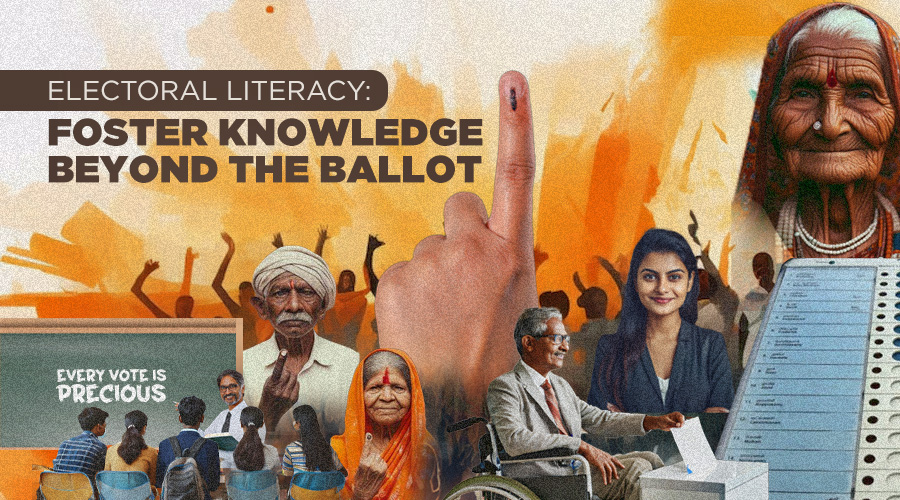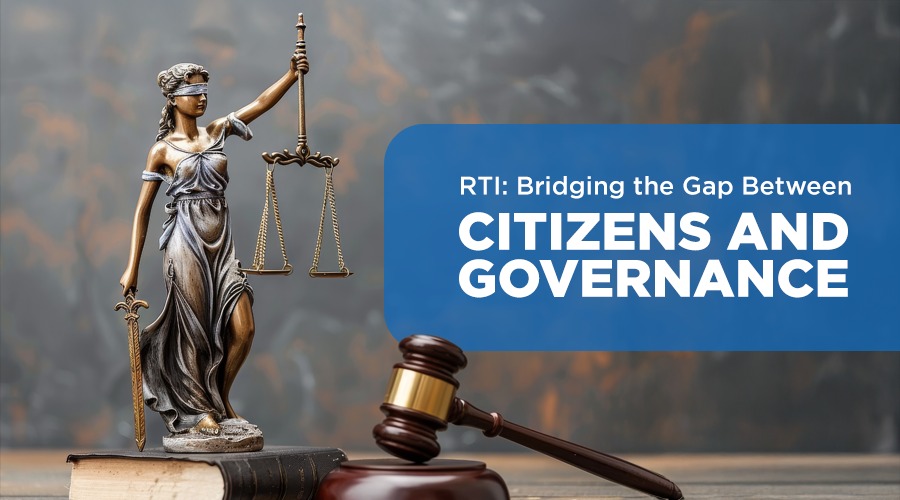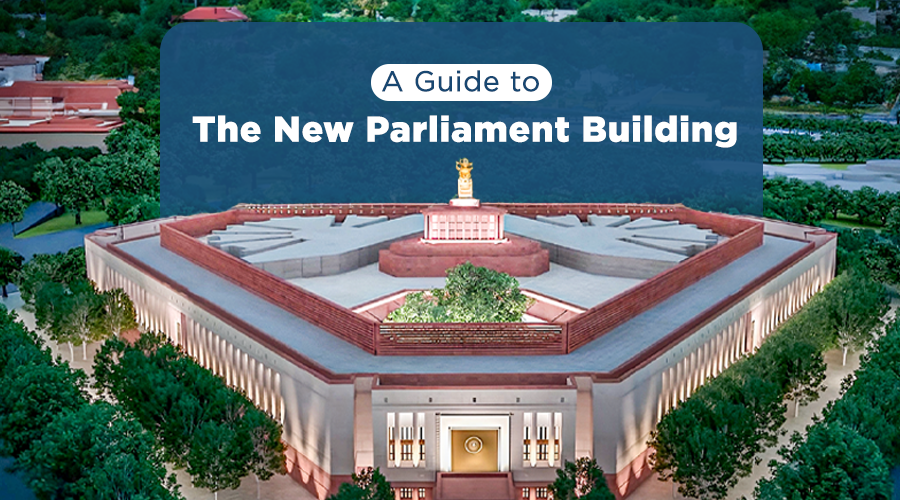Democracy is often hailed as the cornerstone of modern political systems and the backbone of a robust nation. What exactly fuels this backbone? It’s the citizens themselves, armed with civic and electoral knowledge and a deep understanding of their rights and responsibilities. In contemporary society, it’s evident that a vast majority of citizens harbor opinions on their country’s politics and electoral options. While many may hold strong political views, how many citizens know about the nitty-gritty of the electoral process, their rights, and responsibilities?
Electoral literacy is not merely about understanding how to cast a vote; it is about comprehending the entire electoral process, the authorities involved, and the rights and responsibilities associated with being a citizen. It encompasses knowledge about electoral laws, rules, and regulations, and the ability to make informed decisions during elections. This understanding is critical especially in the world’s largest democracy with a population of 1.42 billion people.
Electoral literacy serves as the bedrock of an informed and participatory democracy. In such a vast and diverse nation, electoral literacy emerges as an indispensable tool for citizens to navigate the intricate landscape of democracy. It equips citizens with the knowledge and understanding necessary to actively participate in the electoral process, make informed decisions, and uphold the democratic ideals of representation and accountability.
Understanding Electoral Literacy, Enhancing Civic Awareness
Electoral literacy encompasses the knowledge and skills required for meaningful participation in the electoral process. It includes understanding political structures, the voting system, and the importance of civic responsibilities. The power of an informed electorate cannot be overstated. An informed electorate plays a crucial role in ensuring the smooth functioning of the democratic system. Equipped with knowledge and understanding, these citizens can effectively assess their needs, comprehend the issues that hold the most significance to them, scrutinize candidates, and make informed decisions during elections.
A lack of electoral literacy can lead to voter apathy, poor decision-making, and manipulation by political parties. If citizens don’t understand the electoral process, they might be swayed by misinformation or personal bias rather than making informed decisions based on the candidates’ policies and records.
Promoting Electoral Literacy
Since India’s first election in 1951 with a voter turnout of 45.7%, the electorate has witnessed remarkable progress. In 2019, voter turnout soared to an unprecedented 67.4%, marking a significant achievement bolstered by notable gender parity. Several factors have contributed to this milestone, foremost among them the implementation of SVEEP (Systematic Voter Education and Electoral Participation) by the Election Commission of India (ECI) in 2009. Serving as a flagship initiative, SVEEP focuses on voter education, awareness, and literacy, enriching the democratic fabric of the nation.
Despite these advancements, concerns linger regarding escalating voter apathy, particularly among urban and young voters, prompting the Election Commission to advocate for a 75% turnout in the upcoming 2024 Lok Sabha elections. Recognizing the pivotal role of youth in shaping India’s democratic future, targeted initiatives, especially tailored for new voters, become imperative. Among these initiatives stands the Electoral Literacy Club (ELC), a youth-centric program introduced by the ECI in 2018, targeting educational institutions and rural communities. While ELCs have expanded their outreach, there remains a pressing need for universalization and reinforcement to fulfill their objectives and ensure an engaged and informed electorate for generations to come.
Foundation of ECI-SVEEP
India’s Constitution laid an ambitious vision that every adult Indian, irrespective of gender, formal education, socio-economic status, or geographic location, would possess the right to vote, with each vote holding equal weight. The Election Commission of India (ECI) has admirably transformed this vision into a tangible reality. However, just like other democracies globally, India too grappled with the challenge of declining voter turnout and voter apathy, particularly among specific demographic groups. In the 2009 Lok Sabha elections, out of 717 million registered electors only 417 million voters exercised their electoral rights. A significant portion of the electorate—300 million voters, chose not to participate. This disparity in participation rates was high among women, youth, and urban electors.
This prompted the Indian Govt. to bring voter education to the table of Election management. Today we know the initiative as Systematic Voter Education and Electoral Participation or SVEEP by ECI.
Functions of ECI-SVEEP
The SVEEP (Systematic Voter Education and Electoral Participation) Division at the Election Commission of India (ECI) plays a pivotal role in shaping the electoral landscape of the nation. Tasked with formulating policies, establishing frameworks, planning interventions, and monitoring implementation, the SVEEP Division operates at the forefront of democratic engagement.
- Situation Analysis: A systematic review of current and past electoral data to guide interventions. The assessment is based on population data, elector-population ratio, gender distribution, EPIC coverage, and age demographics
- Targeted Interventions: ECI-SVEEP implements targeted interventions aimed at addressing gender disparities, urban apathy, and youth disconnection. Through tailored campaigns and community outreach, these efforts empower citizens and foster inclusive democratic engagement.
- Partners and Collaborations: ECI collaborates with educational institutions, youth organizations to particularly tap the new voters in the age group of 18-19yrs. It also partners with Central and State Government Departments of health, women & child development etc., and NGOs to promote greater electoral awareness and to seek their assistance in facilitating voter registration.
- Media & Communication: A variety of media, including electronic (radio, TV, film), print (newspapers, pamphlets), and digital (social media), are utilized to communicate with potential voters and disseminate campaign materials. These channels facilitate broad outreach and engagement across diverse demographics.
- Facilitating the Voter: Enhancing voter participation hinges on ensuring that electoral processes are accessible and user-friendly for the public. Various facilitation measures have been introduced to streamline the voter experience. These include online voter registration, easy access to electoral roll search facilities through the ECI website or Voter Helpline App, and the availability of registration forms at prominent locations like banks and post offices. Volunteers stationed at polling booths provide assistance, while comprehensive information on election laws and guidelines is made readily available on the ECI website.
Electoral Literacy Clubs for Youth
India boasts the world’s largest youth population, comprising a staggering 808 million individuals, which accounts for a remarkable 66% of the nation’s populace. Given this demographic reality, harnessing the power and potential of the youth through electoral literacy emerges as an imperative task.
Engaging the youth in the electoral process faces unique challenges. The youth may encounter barriers such as a lack of interest, skepticism towards political institutions, perception of being marginalized or misleading information on social media. Electoral literacy can strengthen civic engagement, and promote critical thinking, thereby fortifying the very foundations of democracy.
To combat the challenge, ECI launched Electoral Literacy Clubs for students. These clubs aim to sensitize school and college students on their electoral rights and familiarize them with the electoral process of registration and voting. The activities and games in these clubs are designed to stimulate and motivate students, encouraging them to think and ask questions. Through these clubs, the Election Commission aims to strengthen the culture of electoral participation among young and future voters.
Who shall be the members of ELCs?
ELCs are present in Schools, Colleges and Rural Communities. Following will be the members in each type of ELC:
Schools: Students from Class IX – XII; 14-17 year olds
Colleges: 18 – 21 year olds
Rural Communities (Chunav Pathshala): All members of the village
How to Enrol School/College for ELC?
To establish an Electoral Literacy Club at school/college, one can reach out to the District Collector, who serves as District Election Officer (DEO) and the Electoral Registration Officer (ERO). Once enrolled, they can then access ELC resources and materials designed by ECI.
Promoting Electoral Literacy at School:
Interactive school engagement programs serve as vital tools in simplifying the electoral processes for students while concurrently fostering a heightened sense of democratic responsibilities among them. Here are some examples:
- Electoral Literacy week around National Voters’ Day
- Debates relating to Electoral Literacy
- Essay competitions, story writing competitions
- Engaging with nearby communities for Electoral Literacy programs
- Drawing and poster making competitions
- Quiz, games, puzzles, cartoons, scrabble, pathfinders, etc.
- ‘Youth Parliaments’ and debates on relevant electoral participation issues
- Technology driven initiatives including social media, student blogs
- Electoral Literacy camps
- Mock vote or simulated voting
- Visitors programme that invites elected representatives, election officials
- Voter registration camps or innovative programs for voter registration
- Any other activities as may be prescribed by the ECI
Electoral Literacy Through Election Habba:
Election Habba, a transformative initiative by B.PAC, stands in the forefront of enhancing electoral literacy and weaving together the strands of democratic engagement. Through informative social media campaigns and on-ground events, Election Habba demystifies the electoral process from voter registration intricacies to the fundamental principles underlying elections. The initiative covers the nuances of constituency delineation to the roles and responsibilities of elected representatives. It also underscores the significance of understanding one’s local MLA, constituencies, and the profiles of candidates running for public office. By instilling the value of each vote, championing the sanctity of the electoral process, Election Habba empowers citizens with knowledge, thus shaping a proactive, sound and progressive democracy.
Key Takeaway:
In an era which is more susceptible to political diffraction, circulation of misleading information and voter apathy due to distrust in political institutions, electoral literacy stands as a citadel protecting our democracy. It empowers citizens to become architects of their own destiny and active participants in shaping the future of their communities and nation. As we collectively strive to build a more informed, engaged, and responsible citizenry, the call to action is clear – prioritize and support initiatives that foster electoral literacy among citizens.





